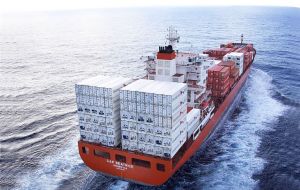MercoPress. South Atlantic News Agency
China confirms is has become Australia’s main client for beef and veal
 Tight domestic supply, increased foodservice demand and improving supply chains makes China an excellent market for beef
Tight domestic supply, increased foodservice demand and improving supply chains makes China an excellent market for beef Australia’s beef and veal exports for March increased 5% year-on-year, to 87,742 tonnes swt, with the Chinese market again setting a monthly record high, at 12,320 tonnes swt (Department of Agriculture, Forestry and Fisheries).
The overall result for the month, while representative of the increase in cattle slaughter and beef production so far in 2013, fell short of half-month estimates for March, most likely due to the shorter working week for Easter.
With trading conditions for chilled beef to Japan remaining very tough, accentuated by the weaker Japanese currency so far in 2013, Australian exports for March declined 3% year-on-year, to 24,253 tonnes swt.
For the first quarter of 2013, export volumes to Australia’s largest beef destination have slipped 5% on last year, to 62,337 tonnes swt.
However, it should also be noted that competition from other markets is having some impact on shipments to Japan, illustrated by the massive surge in product to China, along with rising volumes to a range of markets including Korea, the Middle East and South East Asia.
China continues to exceed expectations for Australian beef almost on a monthly basis, with a record volume registered in March, at 12,320 tonnes swt, 4% above the previous record set in February (11,866 tonnes swt).
The massive March total takes Australian exports to China for the first quarter of 2013 to 28,623 tonnes swt – placing it just ahead of Korea (28,406 tonnes swt) as Australia’s this largest beef export market.
Anecdotal reports out of China indicate that the increased demand could be maintained throughout the remainder of 2013, underpinned by a combination of tight domestic supply, increased foodservice demand and improving supply chains.
While somewhat overshadowed by China, Australian beef and veal exports were also up to Korea during March, hitting 11,249 tonnes swt – 42% above March 2012. For the first three months of 2013, exports to Korea have also exceeded expectations, rising 17% year-on-year, to 28,406 tonnes swt.
Competition for Australian manufacturing beef in other markets, combined with the high A$, resulted in Australian March beef exports to the US declining 33% year-on-year, to 18,059 tonnes swt.
Additionally, the drought-induced surge in lean manufacturing beef out of NZ has increased competition in the US imported beef markets, with more NZ beef entering the US than Australian product so far in 2013.
With the peak demand period for US lean beef nearing, also referred to as the “grilling season”, Australian volumes to the US are expected to pick up through April and May.
Other markets to register increased volumes throughout March included Indonesia (up 24% year-on-year), to 3,005 tonnes swt, the EU (up 45% year-on-year), to 1,489 tonnes swt and the Middle East, which increased 61% on the corresponding period last year, to 4,902 tonnes swt.
Underpinned by increased slaughter and lower cattle prices, Australian beef and veal exports for the first quarter of 2013 was 223,423 tonnes swt – up 7% year-on-year and only 4,000 tonnes swt short of the record first quarter total set in 2007.
Driven by China, the diversion of product away from the traditional big three markets of Japan, the US and Korea continues, with a record 38% of all exports going to “other” markets during the first three months of 2013. This compares to 28% in 2012 and only 7% in 2005. (Argentine Beef Packers SA).




Top Comments
Disclaimer & comment rules-

-

-

Read all commentsSometimes I feel as if china is re-creating its own private bubble,
Apr 25th, 2013 - 07:31 pm 0Good or bad, bubbles have a habit of either bursting, or being used as a bargaining tool to get what you want,
Relying on one nation can sometimes lead to blackmail or pressure against ones own interests.
Still,
Id rather keep my option open thanks.
.
Australia has been China's colony for well over a decade long. Australia will be the first to collapse when China goes down.
Apr 26th, 2013 - 02:09 am 0@2 Really? According to research, “agriculture contributes 3% of Australia's GDP at the farm gate and when value-added processing beyond the farm is included this figure rises to 12%.” So we'll assume the top figure. Losing 12% if GDP might be a little painful, BUT with 88% of GDP left and many more markets, I reckon Australia will “manage”. Who will buy? Given this - http://en.mercopress.com/2013/04/25/uruguay-gm-lambs-which-have-a-luminescence-reaction-when-exposed-to-uv-conditions - perhaps Uruguay would like some?
Apr 26th, 2013 - 10:42 am 0Commenting for this story is now closed.
If you have a Facebook account, become a fan and comment on our Facebook Page!